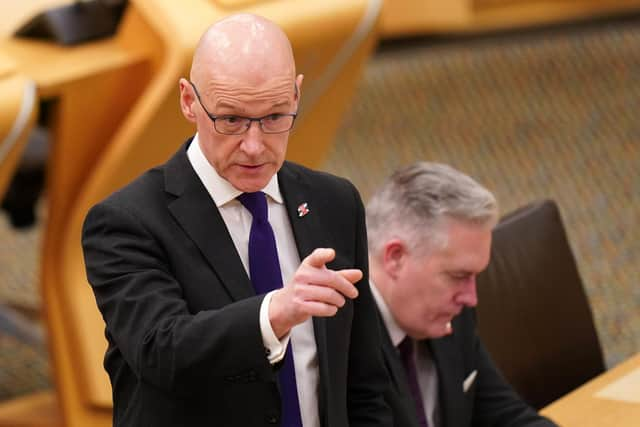Scottish Budget: Scots back tax rises for higher earners and indyref2 fund cancellation
This article contains affiliate links. We may earn a small commission on items purchased through this article, but that does not affect our editorial judgement.
The majority of the headline changes to Scotland’s taxation plans, including the increase of the higher income tax rate and the reduction of the top rate threshold, are supported by a majority of the Scottish public, the survey states.
The poll, from Savanta for The Scotsman, was undertaken between December 16 and 21, interviewing 1,048 Scottish adults aged 16 or over online.
Advertisement
Hide AdAdvertisement
Hide AdIt shows that 58 per cent of Scots back the increase in the top rate of income tax from 46p to 47p, with 19 per cent opposing it, 17 per cent having no opinion and 7 per cent stating they didn’t know.
Increasing the higher rate of income tax from 41p to 42p for those earning over £43,663 was also backed by the same percentage of Scots (58 per cent). However, it is opposed by almost a quarter of the public (24 per cent), with 13 per cent stating they had no opinion and 5 per cent stating they did not know.
The decision to lower the threshold of the top rate from £150,000 to just over £125,000 was backed by a similar proportion of the public, with 56 per cent backing the move, 20 per cent (or one in five) opposing it, and 18 per cent with no opinion and a further 7 per cent stating they did not know.
The most popular measure saw voters overwhelmingly back how the SNP said it would use the extra taxation income, with 73 per cent supporting it going towards health and social care funding. Just 7 per cent opposed, with 15 per cent stating they neither supported or opposed it, and 5 per cent stating they did not know.
The scrapping of the indyref2 fund, earmarked for £20 million in May’s Resource Spending Review, was the next most popular. It was backed by 61 per cent of voters, opposed by just 12 per cent, with 19 per cent having no opinion and a further 8 per cent stating they did not know.


The most unpopular measure, which still saw backing of almost half of Scots (49 per cent), was the decision to freeze the threshold for all other income tax brackets. This often results in the most additional income and means more people pay more tax due to ‘fiscal drag’ on earnings, where pay inflation outstrips the speed of the threshold rises.
While it was the least popular, it was less likely to be outright opposed than the increase to the higher rate, with 16 per cent opposing the move. One in four people (25 per cent) did not have an opinion, while 9 per cent said they didn’t know.
In total, the changes to tax is expected to raise £129m for the public purse, the Scottish Fiscal Commission said. However, the Scottish Government claims this figure is closer to £553m once the threshold freezes are taken into account.
Advertisement
Hide AdAdvertisement
Hide AdCouncils have hit back following the Budget, claiming the proposals risk them cutting essential services due to a lack of additional funding.
Mr Swinney – the acting finance secretary – said the Budget was “bleak”, with the delivery of public services likely to require reform.
Want to hear more from The Scotsman's politics team? Check out the latest episode of our political podcast, The Steamie.
It's available wherever you get your podcasts, including Apple Podcasts and Spotify.
Comments
Want to join the conversation? Please or to comment on this article.
